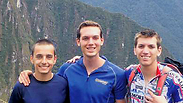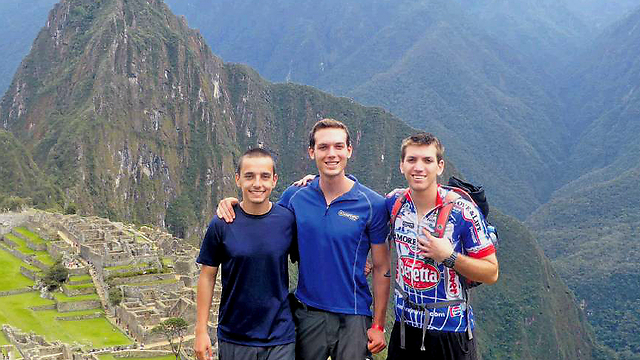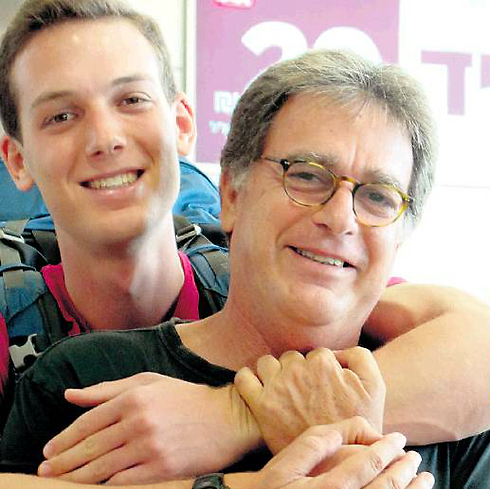
At 8 pm on Monday, Yuval Tal-Nir's mother sighed deeply. "I have a bad feeling," she said. Half an hour later, her husband answered the phone; Nadav Kalifa, the head of the Rescue 1 search delegation dispatched to Peru, was on the other end of the line. "We found him," Kalifa said. "Tell me the first letter of what you found," Rami Tal-Nir asked. "Tell me if he's alive or dead."
From the moment they heard about the rafting disaster in which two Israelis lost their lives, the parents refused to allow their son's name to be published.
"Representatives of the media swarmed on our doorstep," says Yehudit Eitan, an arts school teacher who everyone calls Yuyu. "A television reporter even showed up at 11 at night and tried to play on our heartstrings with 'The entire nation is worried.' And we rejected all their approaches in order to cling onto the hope. If they find the boy in the next minute, what's there to publish?"
"If Yuval had been found alive, we would have remained anonymous," adds Rafi, her husband, an IT worker. "The rescue teams in the area explained to us that the chances of survival were minimal; nevertheless, we chose the irrational decision to believe in a miracle. Throughout the long days of waiting, I always said that if Yuval just gets the chance to get out of the water – perhaps find a branch and float on it to the bank – he'll manage to get by. After all, he's big, strong, healthy, smart and resourceful."
On Monday, after the body of their son was identified, the parents decided to go public, and not merely because their flame of hope had been extinguished. "It pained us when they wrote about 'a second victim' or 'the young man from Tel Aviv,'" they say. "We felt a need to add a name and face to those vague descriptions. Why? Because Yuval deserves to be remembered – a 21-year-old young man, a medical student, on the dean's list, who went with his two good friends on a month-long trip to Peru to celebrate the end of their three years of pre-clinical studies, before continuing on to the next stage."
'I swallowed a lot of water'
We're still talking when the door to the roof apartment in the heart of Tel Aviv opens and in they come – Dor Dulce from Hod Hasharon and Ofek Adar from Lehavim. The road back home was a long one – a 12-hour flight from Lima to Madrid, an eight-hour layover, and then another five hour flight to Ben-Gurion International Airport. But their eyes aren't red only due to the arduous journey.
They still cannot come to grips with the loss of Yuval. Ofek places a plastic bag with two books on a side table – Rational Emotions by Eyal Winter and Stumbling on Happiness by Daniel Gilbert, which Yuval had packed into a waterproof bag and took with him on the rafting trip from which he never returned.
"I was very anxious before Yuval left on this trip," Yuyu recounts. "I was afraid, too, at Passover time, when he went with his friends to Nepal. I had already heard about too many trips that ended in disaster."
Rami says he was only concerned about the rafting expedition, and had therefore said to Yuval: "When you climb the mountain, you're in control, you're the one who chooses to approach the cliff or move away from it; but in the river, you go up and down and the water sweeps you along to God knows where. So please, don't go out without a helmet on your head and without a life jacket."
"That's what we did," Ofek Adar, Yuval's friend, tells him. "Because of your warnings, we also chose a well-known and experienced company. We left on Sunday for a three-day rafting expedition, in three boats – the one carrying six people, the second had the equipment and two seats, and the third was a kayak that followed us all the time. We took the bare minimum with us, mostly warm clothes, and we left most of our possessions at the hostel.
"On the first day, we did various drills; the guide explained to us what to do if the boat hits a rock or someone falls into the water. That night, we set up camp on the bank of the river. The three guides cooked a good meal for us, and Yuval and I went to sleep in our sleeping bags outside the tent. Despite being tired, we started talking. Yuval was happy; he didn't have any sense of foreboding about the future. The rafting for him was the highlight of the trip, a once-in-a-lifetime experience."
They set out the following day for seven hours of rafting. "Yuval and Shir Bechar were in the equipment boat," Ofek continues. "We spent the time before lunch jumping off the rocks – the boat stops, someone climbs onto a rock and jumps into the water. Fantastic fun. After lunch, we switched boats. Two girls moved to the equipment boat, and Yuval and Shir moved into the six-man boat with Dor and me and another two guys. And then, at around 3:30 in the afternoon, half an hour before the end of the day of rafting, the accident occurred."
What happened?
"We got to a rapid – a very strong current. Until then, we had rafted Class III rapids, and the guide warned us that this was a Class IV rapid, with Class V being the highest we're allowed to do. Only the guide goes through Class VI rapids, and the passengers make their way on foot. The guide said it would be 'a technical rapid' and that we'd have to listen to his instructions and act quickly; but we weren't very concerned as he had said the same before. What happened was the six-man boat went into the rapid at the wrong angle, and within seconds it was turned at an angle of almost 90 degrees to the right. Everyone who was sitting on the left fell into the water."
Ofek tells the parents that Yuval was sitting on the left, behind him, and Shir was sitting to his right. "I was the first to fall into the water," he recounts. "The oar I was holding fell in and was swept away. It flew away and I couldn't stop it, but I wasn't afraid that I was going to die or anything like that. I swallowed a lot of water and I was coughing. After about 10 seconds, which seemed to me like an eternity, I found myself floating with the life jacket. Shachar, one of the guys in the boat, held out an oar to me, I grabbed it and climbed into the boat. It took a few minutes for me to gather myself and then I saw that Dor, too, had been hauled back into the boat. He also lost his oar when he fell in. We could see that Yuval and Shir were missing. We waited for them and saw that they weren't surfacing as quickly as we had."
What did the guide do?
"He was terribly agitated and started cursing in Spanish. We maneuvered the boat to the bank, anchored it to a rock and we started searching. Suddenly we saw a red life vest floating on the water. It was awful. Dor and I broke down. The guides got together for an urgent discussion and there was a lot of confusion. Dor and I wanted to remain there to help with the searches, and they wanted us away from the river so that we wouldn't disturb them. In the end, just one of the guides left to call for help and the rest of us remained there. Dor activated his satellite distress signal device. It took a long time for the signal to go through. Meanwhile, night had fallen; we set up camp and it started to rain. It was a terrible night."
Missed call
They were forced the following day to continue the rafting. "It was very hard, but we had no choice. Who else was going to get us out of there?" Ofek says, shrugging his shoulders. "I filmed the exact location with my GoPro, an extreme camera; we only did safe things. Wherever we could, we went on foot. We went straight from the river to the police station in some small town; and after four hours of questioning, we returned to the Chabad House in Cusco, from where we called our parents."
Yuyu and Rami Tal-Nir didn't hear their cellphone ringing in the middle of the night because the device was charging in the kitchen. It was only at 4:30 am, when they woke to too many WhatsApp messages, that they realized that Yuval, their son, was listed as missing.
Yuyu and Rami married 22 years ago (the second time for him, the third for her) and each of them came with a dowry: Rami brought along three children from his first marriage who had grown up with their mother; and Yuyu brought along her daughter, Lior Eitan-Kochavi, now 31 and an art therapist. "When I was 10," Lior recalls, "I asked for a sister or brother, and I got Yuval. Because there was a difference of 10 years between us, I raised him a little. But as he grew up, the age gap disappeared. On Saturday mornings, when we would go to a restaurant, people thought we were on a date."
Yuval, his parents say, had a creative mind. He was assembling complex puzzles before the age of two; and when he was three, they invested a great deal of money in Lego boxes. "He would build at a dizzying pace; I couldn't keep up with him," Yuyu says. "And his room today still contains boxes of Lego that he decided to keep for his children."
He studied plastic arts at the school at which she teaches; and already in 4th Grade, he decided to invent a carrying device to replace the heavy school bags that break the children's backs. He spent a year sailing with the Navy Scouts from Tel Aviv to Ashdod, until he had had enough and quit. He studied the sciences at high school and also enrolled in a pre-medical studies course at Tel Aviv University.
"And then call-ups from the army began arriving in the mailbox," Rami recalls. "Call-ups to pilots school, to elite commando units, intelligence and more. And there was also the option of medical studies as a military cadet."
The parents were divided. "I was opposed to the idea," Yuyu admits. "I argued that a boy of 17 and a bit can't commit yet to a path of seven years of studies and five years of military service." He husband, on the other hand, said to Yuval: "Because it's such a long road, it's best to begin it at a young age."
No comfort
They were pleased when Yuval was accepted into the Tzameret program at Hadassah Medical Center in Ein Kerem, where 60 students from around the country are trained for combat medicine. He lived in the dorms, started a jogging group, and his friends, Dor and Ofek, tell of "the Tal-Nir Index" that came to be in the classroom. After every exam, they'd rush over to look at Yuval's answer sheet and thus be able to work out the grade they'd be getting.
Yuval returned to his parents' home every weekend. "And his studying habits drove me crazy – sitting in front of presentations about the circulatory system with the music at full blast," Yuyu jokes. "He was incapable of studying quietly."
The weekends were also the time for heart-to-heart conversations with Lior, his sister. "We were the best of friends; he told me about his dates and there were no secrets between us," she says with tears in her eyes. "Yuval also promised me that one day he'd invent a cure for my migraines."
Yuval became a vegetarian when he first began his studies – "not because he felt sorry for the animals," his mother stresses, "but because of an obsession about healthy nutrition. We changed our entire kitchen; I cooked without salt and without sugar. I found myself looking for millet and powders and grains for him; but because he really loved meat, he allowed himself once a month to go to a restaurant with his father and devour a kilo of steak."
He was very happy to eat meat in Peru, too, his friends tell her. "For Yuval, a trip meant freedom from everything," Ofek says. "He guzzled meat and ice-cream and chocolate, took endless photographs and was simply happy."
"There's no comfort," Yuyu says, choosing her words carefully. "But it makes me happy to know that he was with the people he loved most, in a place he had dreamed of; and they told us, too, that he didn’t suffer as he was killed instantly. And I'm happy they found him. There are parents whose children don't come home – not even in a coffin."

















